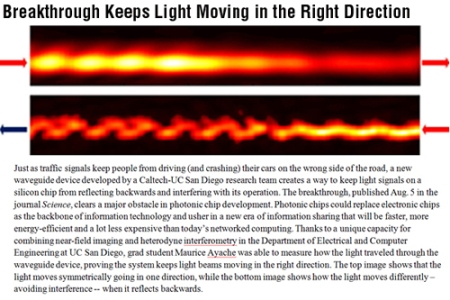A Caltech-UC San Diego research team has achieved “non-reciprocal light propagation”.
 Breakthrough Keeps Light Moving in the Right Direction. Credit: Caltech-UC San Diego Research Team
Breakthrough Keeps Light Moving in the Right Direction. Credit: Caltech-UC San Diego Research Team
They have developed an optical waveguide system that can channel light in to different patterns based on the direction of propagation.
The waveguide system is made of metallic-silicon. The light patterns are asymmetric when they are reflected backwards in their path and are symmetric when they travel forward. The backscattered light gets dissipated as it happens in diodes. Diodes in electronic chips prevent interference by allowing current to travel in a single direction, and researchers have been trying to reproduce this property in photons.
Light signals on silicon chips can reflect backward and interfere with photonic components and lasers, and affect the stability of the chip. Photon chips are faster and do not lose data as quickly as electronic chips. Basic computer technology is currently based on electronic chips, while fiber optic networks that use photons are used for information systems.
Photonic chips currently support data transfer rates of 10 Gbps which is expected to go up to 40 Gbps within five years.
The discovery of nonreciprocal light propagation is a breakthrough achievement in integrated photonic chips development. This could lead to cost-effective, energy-efficient and faster optical networks for sharing of information.
The researchers used a near-field scanning optical microscope for capturing the light within the metallic-silicon optical waveguide device. They combined heterodyne interferometry and near-field imaging for performing the analysis and measurement of the light signals.